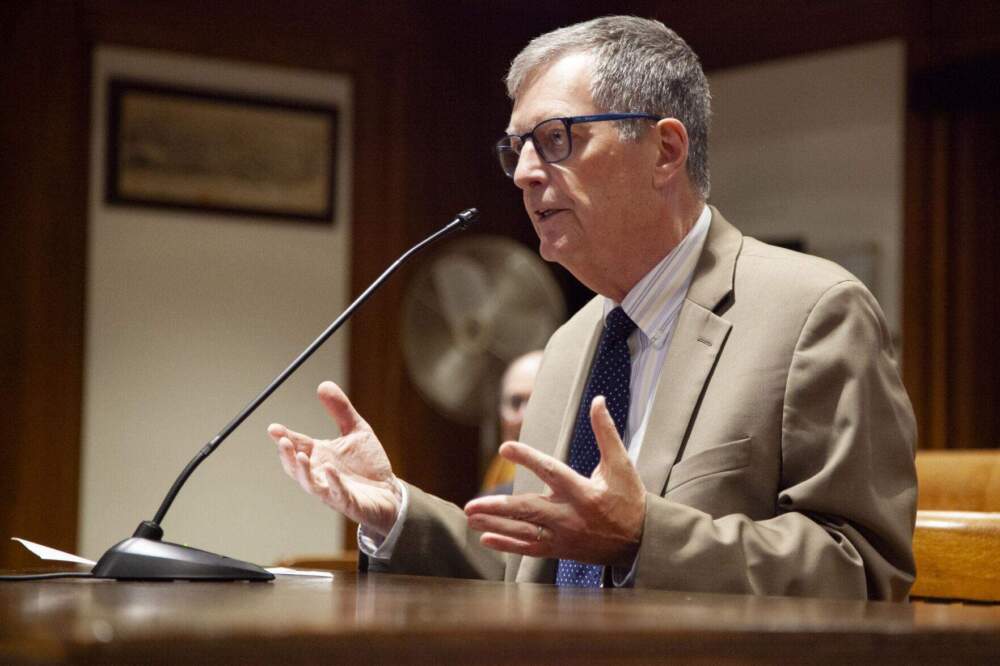Advertisement
Mass. lawmakers eye revival of panel to help struggling journalism industry

Tax credits for local publishers, grant funding for news organizations, and state-covered wages for recently graduated reporters who cover underserved communities are all on the table as Massachusetts lawmakers consider how best to support the ailing local journalism industry.
A previous state commission tasked with reviewing the topic never completed its work, but the Legislature is eyeing another pass this year at exploring the upheaval afflicting local news and what state government can do to help. Rep. Paul McMurtry and Sen. Pavel Payano, who chair the Community Development and Small Businesses Committee, signaled plans to convene a reshaped journalism commission this fall that would produce a suite of recommendations by the end of the year.
They hosted a hearing Wednesday to solicit feedback from reporters, editors, publishers and other industry figures about who should sit on the revived commission and where it should turn its attention.
Dan Kennedy, a Northeastern University professor and longtime commentator on the state of local news, recounted first weighing the idea of a journalism commission with former Rep. Lori Ehrlich in 2018.
"Unfortunately, the situation that we were hoping to address in 2018 has only gotten worse," Kennedy told lawmakers. "According to one widely cited study, about 2,900 newspapers across the country have closed since 2005. Most of those are the sorts of weeklies that really produce hyperlocal community journalism. In Massachusetts, Gannett, the largest corporate newspaper chain, closed or merged about two dozen weekly papers two years ago, and replaced local news with irrelevant content from around the region."

A parade of speakers shared experiences and perspectives on the industry crunch, much of it fueled by corporate and hedge-fund maneuvering or a sharp decline in advertising dollars as platforms like Google and Meta swallowed those revenues.
Chris Faraone, a co-founder of the Boston Institute for Nonprofit Journalism, was blunt about his sometimes adversarial relationship with Beacon Hill dating back to his days as a writer for the now-shuttered Boston Phoenix.
"In all of my forays into your lawmaking affairs, I have found few fans of Fourth Estate forensics under the magical dome where no official needs to fear a FOIA," Faraone said. "Yet despite all that, I humbly sit here seeking pity, not like a reporter groveling for grant money, because we are past that, but more like a diabetic who needs insulin or else."
Several other states have enacted or are pursuing measures designed to provide a lifeline to news outlets, especially smaller, hyperlocal organizations covering communities that otherwise might struggle to find out what's happening at Town Hall or how their tax dollars are being spent.
Illinois and New York are working to provide tax credits to outlets that hire and retain local journalists, Kennedy said. New Jersey has a Civic Information Consortium that provides grants to news outlets and community organizations.
California, Washington and New Mexico also have state-funded fellowships for new journalists in local newsrooms, according to Candace Clement, the managing director of nonprofit Free Press Action.
Advertisement
Lawmakers in California are also weighing another measure that would require major tech platforms like Google and Meta to share a portion of their news-related profits with newsrooms.
"There are other states that have come up with solutions that we might want to explore," Payano, a Lawrence Democrat, said after the hearing. "I'm coming out of this extremely hopeful because there are already ideas out there. I can't wait until we gather these individuals together and see what they come up with."
As Wednesday's hearing drew to a close, Jan Brogan with the Boston University Summer Journalism Institute asked lawmakers about the odds of Massachusetts putting state dollars on the table to support newsrooms.
"I'm not speaking for the entire Legislature, but myself, anything's possible," McMurtry replied. "We all learned a lot today. If we somehow can find some stream of revenue that supports some local, independent news, then we'll do that."
Some outlets have found success with nonprofit models, like Brookline.News, and journalists urged lawmakers to feature those voices on the reimagined commission.
"We applaud lawmakers' efforts to revive the journalism commission, but the details do matter here, and it's crucial that lawmakers keep a core question in mind: will Massachusetts invest in a new, sustainable future for local news, one that's rooted in community need rather than corporate profit?" Clement said. "Or will we simply prop up an ailing media system that has long failed to provide the kind of public service journalism that's most needed?"
A 2021 economic development law signed by former Gov. Charlie Baker created a 23-member legislative commission to "study journalism in underserved communities in the commonwealth."
McMurtry said lawmakers held conversations about the topic after that law was signed, but the commission never fully came together or completed its report that was due Aug. 1, 2021.
Now, McMurtry said, Beacon Hill wants to take another stab. He added that lawmakers will likely need to act to change the membership from the originally outlined version.
"We anticipate perhaps getting [a commission] together in the fall so that we could deliver something before the end of the calendar year," he said.
This article was originally published on June 26, 2024.